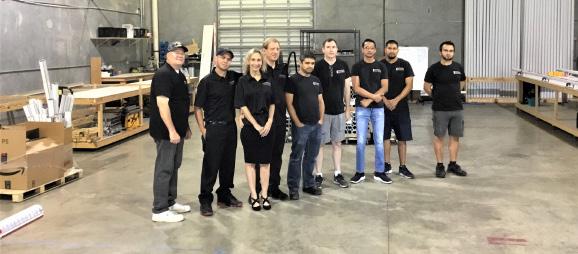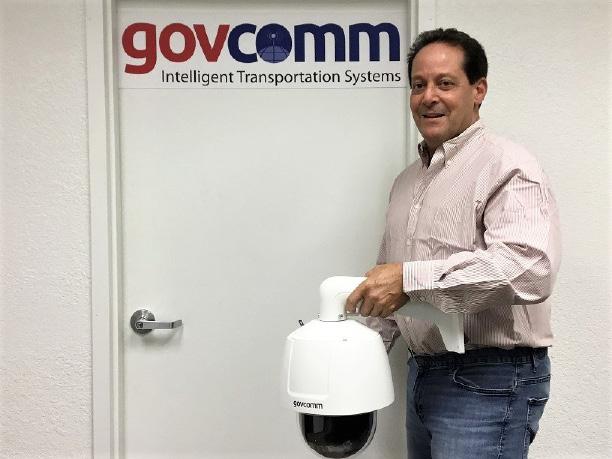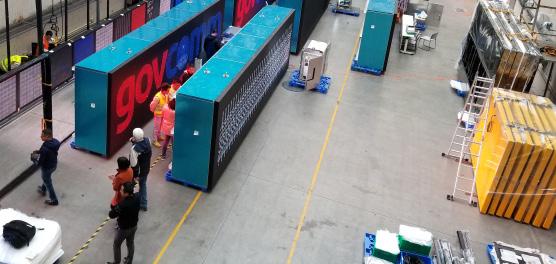
4 minute read
Manufacturer Profiles

GateArms: Overcoming Barriers to Growth
Advertisement
Jonathan Brinkman was running his software development company, BlackSky Technologies, when he noticed a recurring problem at the sites of his Home Owner Association customers: drivers entering the communities kept hitting the barrier gate arms with their cars. “We saw cars and trucks crashing into expensive gates and doors with no apparent solution,” says Brinkman, who has a background as financial analyst, tech educator, IT executive and software engineer. To improve safety at community gates, Brinkman formed the manufacturing company GateArms.com, which produces LED lighting for barrier arms and swing gates. The success with LED lights on gate arms led to other new safety lighting products, including industrial light kits for commercial garage doors and warehouse loading docks. He recognized there was an opportunity to expand the product line and bring a higher level of safety awareness to industries fraught with work-related accidents and injuries. In the process, he has grown the company from two employees to 12 today. However, growth has not been without challenges. He faces many of the same obstacles many growing businesses face – the need to understand his markets; finding reliable suppliers; keeping good inventory levels; shipping on a timely fashion; creating a good management system; and dealing with unexpected tariffs on international imports.
While finding personnel is a concern reported by many South Florida manufacturers, Brinkman has been able to overcome obstacles by focusing more on the soft skills of new hires and teaching them the hard skills. In the beginning, the company’s production staff mainly consisted of unskilled labor. Then the company trained them, teaching them how to be skilled specialists who are comfortable working with metal working equipment, he says. “Different company roles require different skill sets,” he says. “Our production employees must be reliable, hard-working, physically strong, able to work in heat and cold, organized, and possess good judgment. Our sales employees must have passion, integrity, be hard working and have a strong desire to succeed. Our management employees must be experienced, levelheaded and cool under pressure; firm but kind. It has not been overly difficult to find good employees. South Florida is full of qualified applicants.” He realizes, however, that the need for highly skilled specialists will only grow as the company continues to expand. The company is shifting to high-tech machining and design, he says: “So we will require CNC [computer numerical control] and CAD [computer aided design] subject experts who can run mills and lathes.” Moving forward, he says other key challenges will include ensuring good cash flow to fuel growth, finding reasonably priced production space in which to expand, and discovering ways to engage new customers.


GovComm: Navigating the Road to Success
The next time you see a sign alerting you of an emergency ahead while driving, it may be because of GovComm. A maker of quality weatherproof cameras and microwave sensors, GovComm’s equipment and software enables real-time communication from the roads to transportation management centers. States regulate the use of such equipment by local transportation departments by certifying which equipment may be used. GovComm is one of a few qualified intelligent transportation system manufacturers certified in Florida. Getting into a market with few competitors was a shrewd business decision by GovComm founder Craig Waltzer, a former certified public accountant by trade who says he “got bit by the technology bug” after working with a former client. Well versed in the difficulties of growing a business even before he launched GovComm in 2012, Waltzer already had taken a previous technology business public before exiting it. Despite the experience, the road has not been smooth. The competition, he says, includes longer-established companies that like to squeeze the newcomers out of the market. There also are the issues particular to manufacturing. Just being identified as a manufacturer is tricky, he says, especially for those in advanced manufacturing:
“Most technology components are manufactured overseas with a vast majority in Asia. In today’s climate of trade wars, tariffs and prohibited manufacturers, it is difficult to determine the true manufacturer of record -- Is it the designer? The company who assembles? The owner of the MAC address, UL and FCC certifications? The author of the firmware?” Finding personnel to grow also has been a challenge, he says. The company launched with its two business partners. Today it includes technicians, administrative staff and developers. “Due to the sophisticated nature of our customers,” he says, “we do not have the need to maintain a large staff to ‘spoon-feed,’ as is the case in a consumer market.” In addition to individuals with technical skills, the company seeks people with communication skills. “We have had some difficulty finding people that are both technical and personal,” Waltzer says. “We’ve found that the most important skills are understanding the most fundamental concepts,” he adds. “It is incredible that to find that highly accredited graduate students do not understand basic concepts.” While Waltzer is optimistic about the future, he is concerned about the current political environment of trade wars and government bureaucracy: “I see government prohibitions and controls as the major impediment to growing our manufacturing business,” he says.








